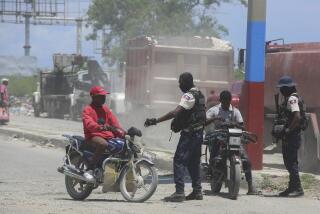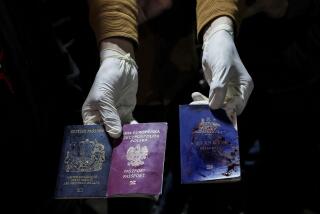4 Aid Workers Killed in Iraq
- Share via
BAGHDAD — Four American missionary workers were shot to death and another was wounded Monday evening in the northern Iraqi city of Mosul, where they were researching needs for humanitarian projects.
It was the second attack on American civilians in less than a week and the second instance of American missionaries being killed in Iraq.
The missionaries in Mosul were working under the auspices of the Southern Baptist International Mission Board. Larry T. Elliott, 60, and Jean Dover Elliott, 58, of Cary, N.C., and Karen Denise Watson, 38, of Bakersfield, were identified as three of those killed.
David E. McDonnall, 28, and Carrie Taylor McDonnall, 26, of Rowlett, Texas, were also shot. One of them later died while being transported to a hospital in Baghdad, but officials did not immediately say which one. They have served with the International Mission Board since November 2003.
The Elliotts were new to Iraq; they had arrived less than two months ago. They had served with the International Mission Board in Honduras since 1978 and arrived in Iraq in February, according to information posted on the organization’s website. Watson had been with the board since March 2003.
The missionaries were killed Monday sometime after 5 p.m., according to an e-mail sent by Lt. Col. Joseph Piek, the public affairs officer for Task Force Olympia, based in the city.
They are believed to have been driving a Nissan Patrol, the type of four-wheel-drive vehicle that civilians working for the occupation government often use.
The president of the missionary board, Jerry Rankin, said all Southern Baptists shared the sorrow and grief of the victims’ families and co-workers.
“In times like this, there are no words that will take away the pain of a loved one’s violent death,” Rankin said. “Everyone in the IMB family and everyone who loves Southern Baptists’ overseas workers are grieving with the family members and co-workers of these precious souls.
“We are grateful that God himself comes alongside us in our deepest sorrow and comforts us in a way no one else can.”
Locals in Mosul seemed not to know the victims but said some people believed they were in the CIA or Freemasons, groups many Iraqis regard with suspicion, a local journalist said.
Mosul, once considered one of the safer cities in Iraq, has become increasingly dangerous in the last three months with almost daily attacks on Iraqi police, politicians and some U.S. soldiers.
Mosul is a mixed community of Sunni and Shiite Muslims as well as different ethnic groups, including Arabs and Kurds. Christians also have a presence in Mosul. The city was one of the centers for loyalists to former Iraqi President Saddam Hussein.
More to Read
Sign up for Essential California
The most important California stories and recommendations in your inbox every morning.
You may occasionally receive promotional content from the Los Angeles Times.










